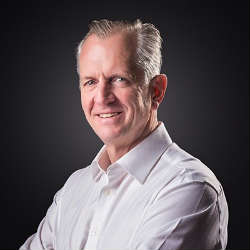
ET: Can you give me a 30 second pitch for Support Revolution?

Mark Smith: “The reason that people consider Support Revolution is as an alternative to Oracle and SAP. Customers are fed up paying high fees and having mandatory upgrades and software that really these days gives them no return on investment. What customers want, and that we deliver, is an alternative that allows them to sweat their IT assets and get back in control of their IT estates if and when they upgrade. If they go on a journey to the cloud, they can choose to go the cloud if and when they want to and not be forced to. In summary we offer flexibility and customer focus to give the customers what they want to do with their Oracle and SAP estates.”
ET: Who is your inspiration and why?
Mark Smith: “I do read a lot of business autobiographies. I take inspiration from many of these. If I was forced to choose one it would be Jeff Bezos of Amazon. The reason for that is he has revolutionised the internet shopping market so much so now that I and many others expect to go in the internet order something and to get it delivered tomorrow. I know that in order to do that there have been lots of challenges in his way. Jeff Bezos and Amazon put the customer experience first and then sort out all the problems and go through all the difficulties to live up to their promises. Putting the customer first and changing the world for the better is pretty inspirational.”
ET: How would you describe your leadership style?
Mark Smith: “If I was forced to pick one then it would be, as a visionary. I see my role as to mobilise the people working at Support Revolution to deliver our vision. We try and give our team as much freedom as possible. Steve Jobs once famously said ‘It doesn’t make sense to hire smart people and tell them what to do. So, we hire smart people so that they can tell us what to do.’ I very much like to follow that approach.”
ET: What are your personal challenges for the next 12 months?
Mark Smith: “The business is expanding and we are looking at opening new offices to cope with that expansion. My personal challenge is to make sure that all that expansion goes smoothly. We need to take stock of how and where we expand to, and in what order. Not take things too quickly and not take things too slowly because our competitors are pushing. One of them in particular is pushing hard to take over some markets globally and we need to keep up with that. One of our biggest challenges is to make sure we are in those battles and that we are winning as many as we can.”
ET: What was your darkest (business) day and how did you overcome it?
Mark Smith: “It’s a very easy one to answer. After about ten years in business as an Oracle and SAP partner we really faced the credit crunch. It started a bit slowly, people did not believe it was long term. When it hit one January, the company was up to all its credit limits and I was down to my last £500 in the world. We needed one particular deal to come in within four weeks or we would have gone bust. It was a big deal and luckily it did come in.
“What that allowed us to do was to take a step back and say ‘ Well , what is wrong with this’. We did revisit our business model and looked at the whole business again. That is when we founded Support Revolution to do something completely different because the original traditional Oracle and SAP partner doing upgrades, wasn’t working. It was the darkest business day but it led us towards a brighter future.”
ET: What was your proudest moment?
Mark Smith: “After founding Support Revolution, being named by Gartner as one of the top three suppliers globally for providing third party Oracle and SAP support. Gartner are a hugely influential organisation, trusted by many CIO’s to help them with their IT Strategy. To be named by them as a leader globally was a huge honour.”
ET: Can you share a tip for CEO’s?
Mark Smith: “Go with your instincts. Obviously, you need to consult with your most trusted advisors inside and outside of the business and take their advice and guidance into account. But there is no guarantee that what they recommend or what works for other companies will work for you. Once you have done that groundwork and taken that advice, take a clear decision or set of decisions in a timely manner and then communicate clearly. Then if it works great, if it doesn’t then revisit and tweak it until something does work. The worst thing you can do is be licking your wounds while you could be doing something about it.”
ET: What was the latest Business book you read, your favourite book and/or podcast?
Mark Smith: “The latest one Amazon is one about Jeff Bezos, The Everything store (The Everything Store, Jeff Bezos and the Age of Amazon by Brad Stone). I was particularly interested in that because it was about how Amazon took risks early, particularly in the cloud computing arena. Now we, and Gartner, see them as a clear leader. That, and it was about diversity. Amazon became not only the clear leader in Internet Shopping but when they branched out into Cloud Computing, in a completely different area, they managed to dominate that as well. That was a very interesting read”
ET: What’s the worst and best decision you’ve made as a CEO?
Mark Smith: “Probably the worst decision: We started our first company about twenty 20 years ago which was an Oracle and SAP partner. When I started that I had no experience whatsoever of working in an Oracle or SAP organisation. Before that I was an independent contractor. The learning curve was absolutely huge. In retrospect I should have worked in a similar business, learnt some lessons and then started out.
“The best decision was to stop doing that when the credit crunch came and to concentrate on delivering third party support. Customers love that service, flexibility and the savings they can make. It has really turned the business around from being just one of twenty Oracle and SAP partners in the UK and Europe to one of three organisations globally that are offering an alternative for customers.”
ET: What are the key business challenges for the next 12 months?
Mark Smith: “Globalisation In the next twelve months. Particularly, Eastern Europe and Asia Pacific and expanding into those markets. It’s about how we do that. Making sure that we deliver the services, taking into account the local requirements.”
ET: What keeps you up at night?
Mark Smith: “Not too much these days. In the past (yes), the uncertainty in the future when we were working as an Oracle and SAP partner. We were depending upon decisions they made that could impact our business massively. Now that we are offering third party support and the business is growing 50% year on year in terms of revenue growth, there is very little that keeps me up at night.”
ET: How do you prioritize your day? On what and how much time you spending in different areas?
Mark Smith: “It depends on the business needs at any particularly time. Most recently we have been concentrating more on digital marketing and how that works globally. For example, in some markets Google isn’t the main search engine. When we look into new markets, I tend to get involved with that, with the people in sales and marketing, and then on delivery. I spend most of my time looking for areas in the business that we need to develop and then taking the lead on that. Once I have got it to a certain level handing that over. At the moment that tends to be digital marketing.
“There is also making sure that we are using the best IT systems out there. We are intending to improve one or two of the older systems that we have around HR for example.
“In terms of the proportion of my day, I spend about eighty per cent on vision and strategy and twenty per cent on operational issues. If I find I spend too much time on operational issues I need to give that job to someone else. It’s a good indicator that I am not doing things properly if I am spending too much time on delivery rather than vision and strategy.”
ET: Which (three) technologies will influence your industry most in 2019?
Mark Smith: “One that sticks out is cloud. What is happening is that SAP and Oracle cloud offerings are not mature enough to replace the legacy ERP systems. What that means is that people are avoiding going to those clouds. That focuses their minds on sweating their assets from their current systems. As customers are not taking the leap to those cloud offerings at the moment they are not wanting to do upgrades as well. That is having a positive effect on our business in a back handed way.
“In terms of other initiatives, moving to the cloud for non-ERP systems is a major influencer because some customers want to move their whole estates to the cloud, not huge amounts. The ones that start on that journey find that the actually cloud becomes part of their armoury rather than the answer. It is really just the cloud one that we are seeing.”
ET: You recently revealed in an article in Computing that Oracle were auto-renewing contracts and SAP had created a new audit team for 2019. What should CIO’s do?
Mark Smith: “What they need to do is keep one eye on Oracle’s and SAP’s tactics. Obviously, Oracle and SAP get massive fees from support and maintenance contracts and their whole goal from this is to protect that revenue. They will continue to make these changes. I would suggest that CIO’s keep up with information provided by organisations like ourselves on news such as that. Also on things that are available in the wider marketplace to make sure that they don’t fall foul of Oracle and SAPs changes and practice.
“If they are a large organisation, we would expect them to have some form of relationship with a licensing specialist that helps them manage their estate. This makes sure that they are licensed appropriately. They should consult those experts, as well as ourselves, to make sure they are familiar with any changes and plan accordingly. They need to make sure that Oracle and SAP are not changing the rules on them.”
ET: We’ve seen your competitor Rimini Street branch out into wider Database management, Security and Salesforce is this something that Support Revolution will also look to do?
Mark Smith: “We already do database and security as well, and have done for 18 months. We are not looking to expand into CRM managed services as we do not see that as complimentary to our current set of products. It looks a bit left field to us. We do offer cloud services. We help to move customers to Amazon. We do have our complimentary services though our parent organisation. Such as: If you want us to do managed services, move your Oracle system or your SAP system to Amazon cloud and let us look after you. We are doing additional managed services, but slightly differently to our competitors.”
ET: Rimini Street has gone through funding rounds for various reasons. Support Revolution has not yet sought funding, is that on the cards in order to assist with the global growth?
Mark Smith: “We have no plans to go out for funding for a variety of reasons. One of the reasons is the business books I have read. People like Richard Branson who went out for funding, had lots of capital invested in the company and found it was the worst thing he ever did. He ended up buying it all back in the end. That is certainly something I am a little bit concerned about happening.
“The way the business is working for us is that we are growing revenue about 50% year on year at the moment. We are able to do that organically so we don’t need funding at the moment in order to expand globally. The other side of the fence is that you can run before you can walk. There is a danger of taking on too much money and too many markets in too short a time frame. The plan for the next 12-18 months is to continue to grow organically.“
ET: What’s the one question you’d like to ask another CEO to answer and can you answer it then yourself?
Mark Smith: “I would like to ask about them about their journey; past and present. One of the things that happens with most CEO’s is that they manage their organisation and they make many decisions, have many meetings and are involved in a lot of that direction. But if they are like me, very few people ask me about my journey and my vision.
“Getting to speak to another CEO to talk to them on a level and ask them about their journey and their plans for the future, I would find that interesting. Certainly, when I have asked people in the past, I have learned about how other people think and how that maps onto my journey.“
ET: What is your vision?
Mark Smith: “I’m fifty-four years old now. I don’t see myself retiring and I haven’t got any plans to exit. What I am looking to do is grow this business globally. We are already a top three globally. To consolidate that position and grow the organisation into something much larger. I really understand the marketplace and I really want to build on that and to make a significantly large organisation and become a global player.”
ET : “Thank you, Mark”
Mark Smith: “Great, thanks for your time.”

























